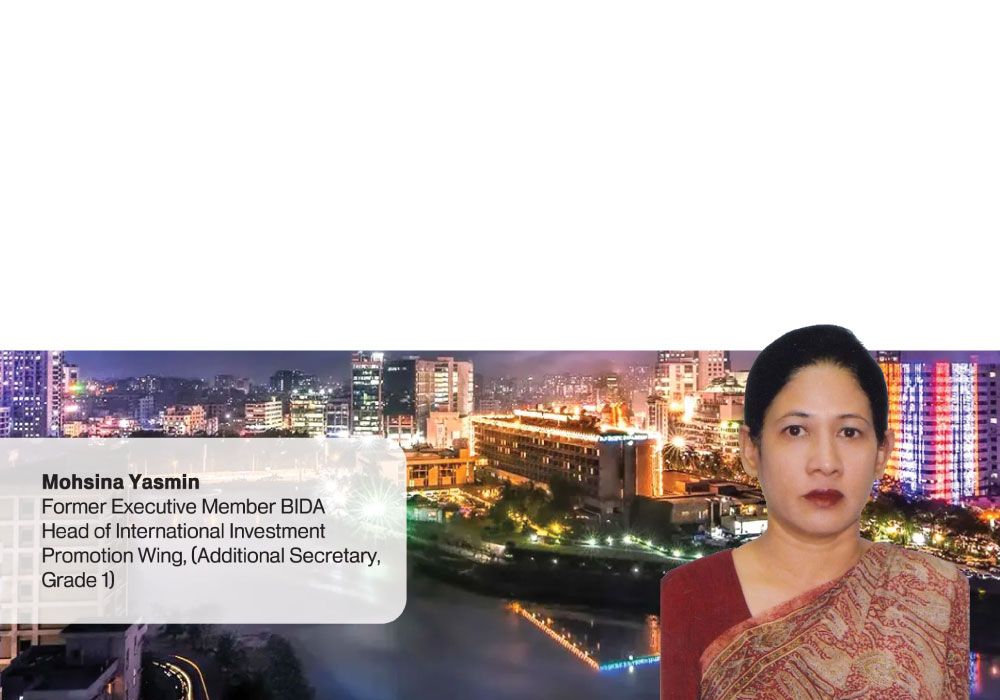- info@ficci.org.bd
- |
- +880248814801, +880248814802
- Contact Us
- |
- Become a Member
- |
- |
- |
- |
- |

I had the distinct privilege of working at the forefront of Bangladesh's efforts to attract foreign direct investment (FDI). Over the years, I have witnessed the transformative impact of foreign investment, and although it has not reached the desired levels, its positive and exciting effects on our economy are evident. Bangladesh has made significant strides, but as the global landscape shifts, our strategies must evolve to remain competitive and attractive to international investors.
When I first joined BIDA, Bangladesh was emerging as an appealing destination for labour-intensive industries such as textiles and garments. However, our investment ecosystem was still developing. Regulatory processes needed refinement, and we were only just beginning to engage in intense competition on the global stage with countries like Vietnam, India, and Thailand. The establishment of BIDA in 2016 marked a significant advancement. It was a bold move to consolidate the Board of Investment and the Privatisation Commission into a single, cohesive entity focused on a comprehensive investment promotion strategy, but this was merely the beginning.
My perspective on BIDA's roadmap for attracting FDI is holistic, shaped by insights gained from engaging with numerous businesses. BIDA's roadmap is not just about policies and figures; it is about creating a vision for how Bangladesh can thrive in an increasingly interconnected world. Looking ahead, BIDA's strategy for attracting FDI must be dynamic and adaptable, prioritising long-term, sustainable growth. The global investment environment is changing rapidly, and we must stay ahead of these trends. Based on my experience, here are the key pillars of our strategy.

Ensuring Ease of Service and Policy Predictability
One of our primary objectives is to simplify the investment process, which led to the development of the BIDA online One Stop Service (OSS) portal-the country's first and largest interoperable platform. This initiative has allowed BIDA to cut through its bureaucratic red tape; however, persuading other service providers to do the same remains a challenge. BIDA's processes are digitally integrated with the OSS, which can be completed in two steps, with the time required ranging from one to fifteen days. This needs to be replicated across all other offices providing investment services that have integrated with BIDA OSS or are awaiting integration.
For this to happen, I believe a fundamental shift in mindset is necessary. Effective public service is a right, and providers must not exercise privilege by denying or delaying that right, as this only leads to unproductive outcomes. I urge Bangla- deshi regulators to recognise the long-term value of providing ease to service seekers, particularly foreign investors, who are especially attuned to quality and standards. Their understanding is key to operationalising BIDA OSS.
Investors seek certainty-be it regarding tax policies, land acquisition, or other investment related laws. Regulatory reforms must be a continuous endeavour, and BIDA should maintain an open dialogue with both local and foreign businesses to ensure policies remain relevant. We must prioritise transparency, predictability, and stability in our legal and regulatory frameworks. This includes enhancing the dispute resolution process for foreign investors, streamlining customs procedures, and reducing unnecessary delays. It is equally essential that any financial or non-financial incentives, along with regulatory changes, are developed through active consultation with both the private and public sectors. In my experience, meaningful dialogue is crucial; investors need to feel that their voices are heard and their concerns are taken seriously. Frequent and unpredictable changes to financial and non-financial incentives, policies or regulations can foster an atmosphere of uncertainty that deters investment. I have seen firsthand how such inconsis- tencies can lead to frustration among investors seeking a stable environment for long-term commitments. By fostering a collaborative approach and ensuring that changes are communicated clearly and consistently, we can build the trust and confidence vital for sustained FDI in Bangladesh.
Coordination is Key
A major challenge in many developing economies, including  Bangladesh, is the lack of seamless coordination among different governmental agencies. To effectively promote FDI, relevant institutions must work together, offering investors clear guidance and a unified experience. Ministries responsible for trade, revenue, finance, industry, and infrastructure must coordinate with BIDA to ensure that investment policies are aligned across sectors to attract global investors. For example, if BIDA is promot- ing investments in the renewable energy sector, the Ministry of Energy must ensure that policies and regulations are conducive to FDI in that field.
Bangladesh, is the lack of seamless coordination among different governmental agencies. To effectively promote FDI, relevant institutions must work together, offering investors clear guidance and a unified experience. Ministries responsible for trade, revenue, finance, industry, and infrastructure must coordinate with BIDA to ensure that investment policies are aligned across sectors to attract global investors. For example, if BIDA is promot- ing investments in the renewable energy sector, the Ministry of Energy must ensure that policies and regulations are conducive to FDI in that field.
Furthermore, regular consultation between the government and industry associations is crucial to align investment policies with market realities. BIDA should continue to organise forums where private companies, chambers of commerce, and international business councils can provide input on proposed regulatory changes, investment incentives, and sectoral development plans.
Sectoral Focus on High-Value Industries
Bangladesh's success in garments and textiles has been a cornerstone of our economic growth, but the future lies in diversifying our industrial base. Over the past decade, we have seen increased interest in sectors like ICT, health, pharmaceuticals, renewable energy, and electronics manufacturing.

INFORMATION AND TELECOMMUNICATION TECHNOLOGY.
During my time at BIDA, I frequently found that investors sought clarity and targeted incentives in these emerging sectors. This is why I strongly advocate for a sectoral approach to FDI promotion. By focusing on high-growth industries like electric vehicles (EVs), renewable energy, and technology-driven sectors, Bangladesh can position itself as a forward-thinking economy ready to capitalise on the industries of tomorrow.
At BIDA, we began laying the groundwork for this during my tenure by identifying key sectors that align with global trends-areas where we could genuinely be competitive. This focus must persist, supported by dedicated investment policies, attractive incentives, and a business environment conducive to innovation.
Investing in Human Capital
Every year, over two million young graduates enter the workforce.  However, over 10% of university graduates were found to be unemployed according to the 2022 census by the Bangladesh Bureau of Statistics (BBS), which may be a conservative estimate. In promoting Bangladesh abroad, I often found that while investors were impressed by our young and sizeable labour force, they were concerned about the lack of skilled workers in certain sectors.
However, over 10% of university graduates were found to be unemployed according to the 2022 census by the Bangladesh Bureau of Statistics (BBS), which may be a conservative estimate. In promoting Bangladesh abroad, I often found that while investors were impressed by our young and sizeable labour force, they were concerned about the lack of skilled workers in certain sectors.





